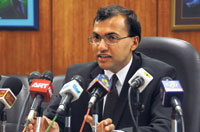The International Monetary Fund (IMF) disbursed US$407.8 million to Sri Lanka this week following the completion of the second and third reviews of Sri Lanka’s economic performance under its US$2.4 billion Stand-byArrangement (SBA).
The Executive Board of the IMF has also approved a request by the Sri Lankan authorities for a one year extension of the SBA and accordingly re-phase future disbursements into seven equal amounts of US$203.9 million in light of the recent delays in the program. At a media briefing on Tuesday just after the presentation of the national budget, the IMF representative to Sri Lanka and the Maldives Koshy Mathai said the IMF is encouraged by the government’s policy proposals and have a fundamentally optimistic view on Sri Lanka’s economic prospects.

Koshy Mathai |
The government has targeted reducing the budget deficit to 8% of GDP this year from 9.8% in 2009. Dr. Mathai said reducing the deficit to 8% is attainable because it is done through a reduction in recurrent spending, not through artificial curtailment of capital spending. He added that Sri Lanka has had an enviable period of macroeconomic stability over the past year with international reserves having reached US$5 billion although there is room to build further. He said monetary policy the Central Bank (CB) is running is absolutely appropriate although fiscal policy remains a concern.
The IMF said that despite the weaker-than-programmed 2009 fiscal performance, the government’s 2010 budget proposal, if carried out, would significantly address past fiscal slippages, mainly through comprehensive tax reforms and sizeable cuts in recurrent spending. At the same time, the budget would allow for much needed reconstruction related infrastructure investment while protecting society’s most vulnerable and addressing humanitarian needs of those affected by the conflict.
The IMF added that the authorities’ efforts to reform trade and excise taxes and the Board of Investment’s (BOI) tax concession regime are a signal that they recognize the importance of a broader tax base and higher revenue in achieving the programme’s original goals of fundamental and sustainable reduction of the deficit and the public debt. The IMF said these efforts should be followed by important steps to permanently reform tax concessions and broaden the VAT and income tax bases to be introduces as part of the 2011 budget.
In a supplement to the July 2009 Memorandum of Economic and Financial Policies and the October 2009 Letter of Intent, the Ministry of Finance & Planning said the government’s policy framework aims at achieving economic growth in excess of 8% while containing inflation at a moderate level. The higher growth is to be achieved by further strengthening the enabling environment for the real economy, in particular agriculture, SME’s and other value adding industries.
The letter stated that line ministries are actively identifying specific areas in which to attract foreign direct investment, including from the private sector. The Ministry of Economic Development, the BOI and the Department of National Planning will jointly work out a new investment strategy to shift the emphasis away from a heavy reliance on tax concessions towards greater predictability of the investment regime and increasing the ease of doing business.
The government has also set a fiscal deficit target of 6.8% for 2011 and 5% for 2012. The letter further stated that improving the performance and efficiency of loss-making state enterprises will help free resources for infrastructure investment and lending to the private sector.
Dr. Mathai described the policy package as being substantial and ambitious and said the IMF has only had general discussions with the government on policy direction. The commitments made in the LOI are not to the IMF but to the people of Sri Lanka, he said. The revised SBA programme is scheduled to end mid-2012. |


